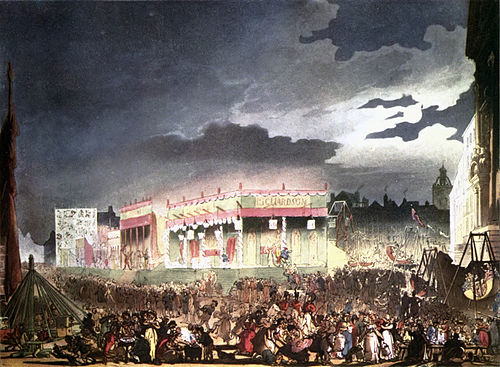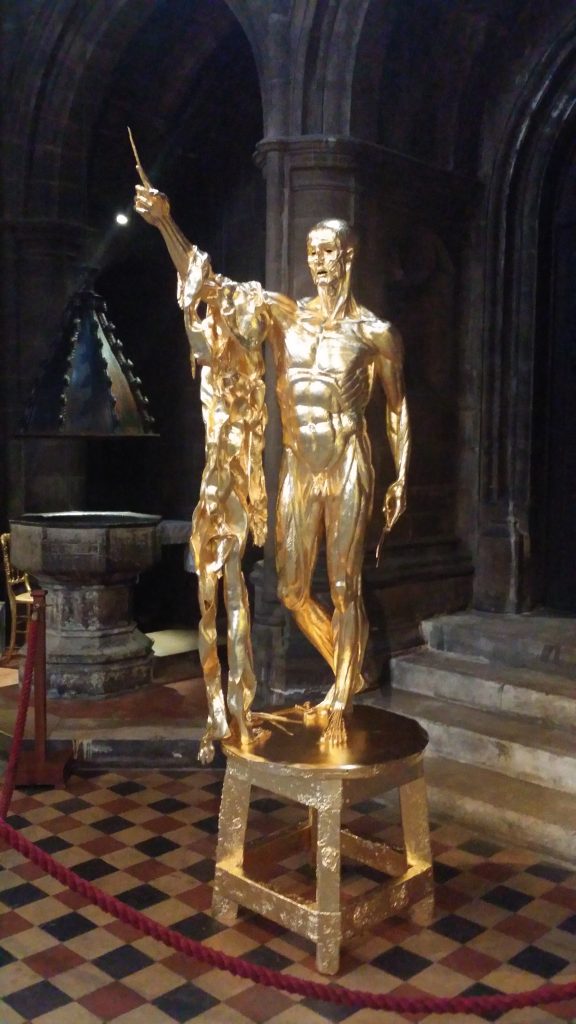
The Fair began in 1133 a few years after the foundation of St Bartholomew’s Priory 1123. Smithfield held a weekly livestock market. But on St Bartholomew’s Day they held an annual Fair. It was originally 3 days long but expanded to 2 weeks by 1753. It became the chief wool fair for England by 17th Century. But it was also rowdy and in 1691, it was reduced to 4 days, and suppressed in 1855.
Ben Jonson wrote a marvellous play called Bartholmew Fair first performed in 1614 at the Hope Theatre on Bankside. In it, he portrays the characters who attended the Fair. There is a ballad singer who sings & sells printed ballad sheets. He spots where his customers keep their money purses. And signals to an accomplice cutpurse who steals the money. Then there is the horse-seller who cheats his customers with his tricks which make an old nag seem like a frisking colt. The Ale Wife in the beer tent froths up the beer, to short measure the beer drinkers, then whips away the beer pot before all the ale is finished, reselling the dregs. There is an absurd Puritan, pompous Citizens, a puppet show, the pig with two pizzles, and other freak shows.
Malfactors at the Fair could expect punishment at the Pie Powder Court, which was held in Cloth Fair at the Hand and Shears which is still a delightful London Pub.
Pie Powder might be derived from the French Pié a Foot, and Poudre Dust. Perhaps because the rustics came from the country with dusty Feet. (Guy Miege, The New State of England, 1693). Or could it be a reference to a Pie, which is the name that was given to a Magpie. Magpies have a folk reputation for theft and might have appeared on the Court sign.
See https://thingsturnedup.uk/tag/pie-powder-court
For my post on magpies click here
St Bartolomew
St Bartholomew was one of the Apostles. But in case you haven’t heard of him he is identified as the same person St. Nathaniel.
The arguement goes that Nathaniel was the son of Tolma or Bar-Tolmai, hence aka Bartholomew. He converted the King of Armenia, but the King’s Brother had him skinned alive. His eyes and tongue remained intact and he continued to proclaim the Gospel until he was beheaded.
So, being skinned he is the patron Saint of butchers, skinners, tanners, bookbinders, and all leatherworkers. Also of those suffering from skin diseases. He is the patron saint of Benevento, where his relics reside.
His martydom is depicted by Michaelangelo. And in the very marvellous St. Bartholomew’s Church in Smithfield, London, there is a golden sculpture of St Bart. by our very own Damien Hirst.

Weather Lore
If Bartlemas Day be fine and clear
You may hope for a prosperous autumn that year.
But it was also said that ‘St Bartholomew brings the cold dew’
It was also the day that might end the 40 days of rain brought by a wet St Swithun’s Day. (If such a long period of summer rain has ever occurred).
All the tears. St Swithin can cry
St Barthelmy can wipe dry.
See my post on St Swithun here
Also on this day:
Black Bartholemew Day
The St Bartholomew’s Day Massacre August 24th 1572.
This was the day when the Protestants of Paris were massacred. Up to 30,000 huguenots were killed in a massacre that spread from Paris to the countryside. It happened following a rapprochement between the religions and the marriage of the Catholic Marguerite de Valois and Huguenot Henry de Navarre on 18 August. Henry was heir to the throne, and prominent protestants were in fiercely Catholic Paris for the celebrations. Riots followed assassination attempts, and attempted genocide followed. Much like the St Brice’s Day Massacre in 1002 when the English King ordered the death of all Danes.
The French massacre led to wholesale emigration of the Protestants to the UK. William Shakespeare lodged with a Huguenot family in London. Being highly educated and skilled the immigrants generally did very well in England but the size of the wave wasn’t without opposition.
First published August 2025
Discover more from And Did Those Feet
Subscribe to get the latest posts sent to your email.
